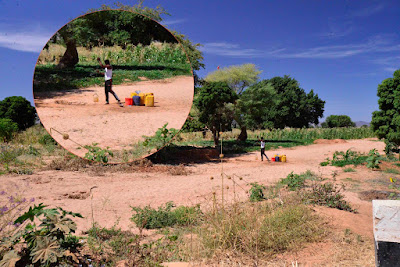Today it is three degrees centigrade colder than London, and the wind has blown all day long from the east with a thin layer of cloud. There is much dust in the air, williwaws* of dust over the road surface, and no hope of rain until October or November. We have socks on, long trousers and pullovers. Hugh is reading 'Sailing Alone Around the World' by Joshua Slocum for the second time. He somehow started browsing it and found it compulsive.
Water is short. The village pump, an electric one for some reason, was installed by government agency, and has ceased to operate: the sluice where clothes may be washed is dry, and the tap pointless. The government may send a team to repair it. There is quite a lot of water below ground. The school has a borehole with a tired old pump that breaks down frequently. The hospital is similarly equipped, but with slightly less chance of running out of water as they have an arrangement with the phone networks that allows them power from the generator when there is a power cut.
In the mean time, people go down to the bone dry river beds to dig for water. Further up the valley, power transmission poles are being replaced, and to do this, the electricity is cut off. We have power today but have had something of a blackout for the last two days. Our cottage has solar lighting, and a gas stove (propane) so only the fridge suffers in the cuts.
 Two days this week we have had visitors from New Zealand who have come to see the school: both have been teachers, and one still is. Jane teaches maths, mostly, and David manages aspects of IT including providing web ready training programmes.
Two days this week we have had visitors from New Zealand who have come to see the school: both have been teachers, and one still is. Jane teaches maths, mostly, and David manages aspects of IT including providing web ready training programmes.Samaki: Swahili for fish. Lake Victoria provides at least three species of fish, and we have eaten at least one of them. Not the entire species, of course. It is difficult to get fish, because the nearest fish live around 250 miles away. On the food front, we have weakened sufficiently to buy a carton of Weetabix. It is quite a surprise that there is no wholefood muesli with spelt and cranberries.
Fish delicious, with a coconut and banana dish, spinach, and rice.
And a footnote about the fish: the lake is landlocked, and these fish evolved quite separately from ocean fish. They are seemingly more cartilaginous and have a great deal of gelatinous juices. The species in Lake Victoria, and Lake Tanganyika, are millions of years old.
Added to that, Lake Tanganyika is 1500 metres deep in the middle, the second deepest lake in the world. And the tallest mountain in Africa is Kilimanjaro, around 19,000 feet. You can walk to the top if you want to.
This is a very ancient and handsome land.
*Williwaw. Windy thing like a mini tornado.

No comments:
Post a Comment